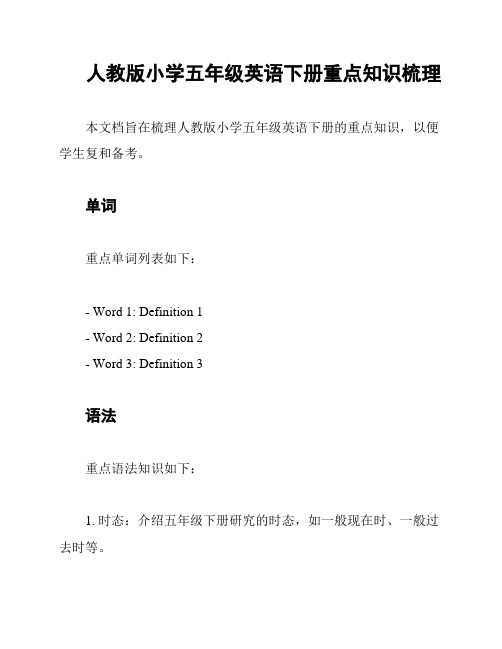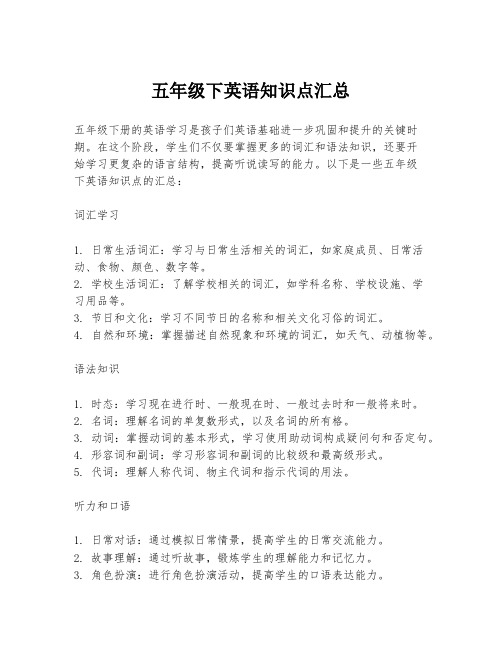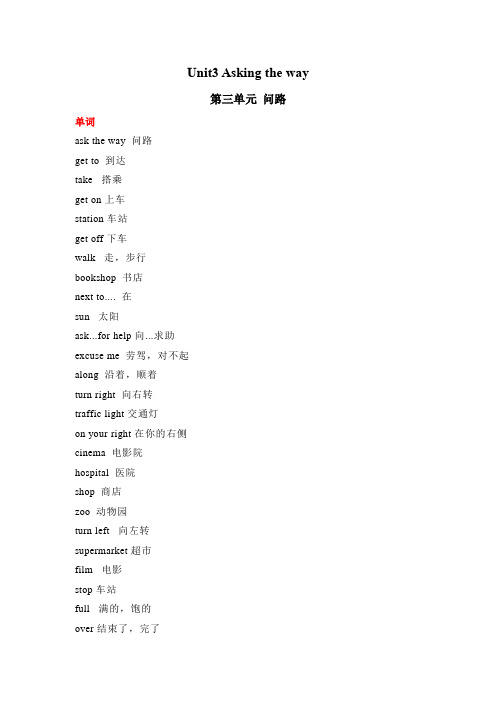小学五年级下册英语知识点汇总3篇
五年级下册译林版英语知识点梳理(完整版)

五年级英语下册总复习教案5B Unit 1 Cinderella二、词组:1.at the prince’s house在王子的宫殿2.So sad 如此伤心e back回来4.have to不得不5.visit every house拜访每一间屋子6.fairy tales童话故事7.Monkey King 美猴王8.find some mushrooms找到一些蘑菇9.draw a dress画一条连衣裙10.for her friend 为她的朋友11.have some snacks吃一些零食12.have a drink喝一杯13.fit well 很合适14.look so nice看起来那么漂亮15.can’t understand不能理解16.would like to do想要做某事17.be bad for us 对我们有害18.take off the shoes 脱下鞋子19.go to the party 参加舞会20.three fairies 三个仙女21.try it on试穿它22.have to go不得不走23.before twelve o’clock 在12点以前24.at the parties在那些聚会上25.beautiful clothes 美丽的衣服26.a lot of mushrooms许多蘑菇27.under the tree 在树下28.try on the shoe试穿鞋子29.eat them 吃了它30.find the girl 找到女孩31.why can’t you…你为什么不能…32.leave…behind丢下…33.hurry up 赶快34.find some drinks 找到一些饮料35.some question words一些疑问词36.fit me 适合我37.draw a picture for me 为我画一幅画38.have a drink喝一份饮料39.look so nice 看起来那么漂亮40.be at school 在校学习41.read a story about…读一个有关…的故事42. pick a big and red mushroom采一个又大又红的蘑菇三、句子:e and help me.过来帮我。
人教版小学五年级英语下册重点知识梳理

人教版小学五年级英语下册重点知识梳理本文档旨在梳理人教版小学五年级英语下册的重点知识,以便学生复和备考。
单词重点单词列表如下:- Word 1: Definition 1- Word 2: Definition 2- Word 3: Definition 3语法重点语法知识如下:1. 时态:介绍五年级下册研究的时态,如一般现在时、一般过去时等。
2. 句型:总结五年级下册研究的常用句型,如祈使句、疑问句等。
3. 词类:梳理五年级下册研究的常见词类,如名词、动词、形容词等。
句子填空本部分包含若干个练题,要求学生根据给定的句子,填入适当的单词或词组。
1. Sentence 1: _________ ________ ________?2. Sentence 2: _________ ________ ________ ________.阅读理解本部分提供了几篇短文,要求学生阅读后回答相关问题。
1. Passage 1: Title of the passage- Question 1: _________ ________ ________?- Question 2: _________ ________ ________?2. Passage 2: Title of the passage- Question 1: _________ ________ ________?口语练本部分提供了几个口语练题,要求学生根据给定的情景进行对话。
1. Situation 1: _________- Sentence 1: _________ ________ ________?2. Situation 2: _________- Sentence 1: _________ ________ ________?以上是人教版小学五年级英语下册的重点知识梳理,希望对同学们的复有所帮助。
祝大家研究进步!(注意:本文档仅提供了梳理重点知识的框架,具体内容请参考教材。
五年级下英语知识点汇总

五年级下英语知识点汇总五年级下册的英语学习是孩子们英语基础进一步巩固和提升的关键时期。
在这个阶段,学生们不仅要掌握更多的词汇和语法知识,还要开始学习更复杂的语言结构,提高听说读写的能力。
以下是一些五年级下英语知识点的汇总:词汇学习1. 日常生活词汇:学习与日常生活相关的词汇,如家庭成员、日常活动、食物、颜色、数字等。
2. 学校生活词汇:了解学校相关的词汇,如学科名称、学校设施、学习用品等。
3. 节日和文化:学习不同节日的名称和相关文化习俗的词汇。
4. 自然和环境:掌握描述自然现象和环境的词汇,如天气、动植物等。
语法知识1. 时态:学习现在进行时、一般现在时、一般过去时和一般将来时。
2. 名词:理解名词的单复数形式,以及名词的所有格。
3. 动词:掌握动词的基本形式,学习使用助动词构成疑问句和否定句。
4. 形容词和副词:学习形容词和副词的比较级和最高级形式。
5. 代词:理解人称代词、物主代词和指示代词的用法。
听力和口语1. 日常对话:通过模拟日常情景,提高学生的日常交流能力。
2. 故事理解:通过听故事,锻炼学生的理解能力和记忆力。
3. 角色扮演:进行角色扮演活动,提高学生的口语表达能力。
阅读理解1. 短文阅读:阅读并理解简单的英文短文,学习提取关键信息。
2. 故事理解:阅读英文故事,理解故事情节和人物性格。
3. 信息匹配:通过阅读,将信息与图片或问题进行匹配。
写作技能1. 日记写作:练习写英文日记,记录日常生活和感受。
2. 书信写作:学习写信的格式和常用表达。
3. 小短文写作:练习写简单的英文短文,如描述一个事件或介绍一个人。
综合运用1. 情景模拟:通过模拟真实情景,让学生将所学知识综合运用。
2. 项目作业:完成一些与英语学习相关的项目作业,如制作海报、编写小册子等。
通过这些知识点的学习,学生们可以更好地掌握英语语言,为将来的深入学习打下坚实的基础。
同时,教师和家长也应该鼓励孩子们多读、多听、多说、多写,以提高他们的英语综合运用能力。
人教新起点英语五年级下册(五下)知识点

2.询问某人生日日期的问句及回答:—When is+形物代/名词所有格+birthday?—It's on+几月几日./形物代/名词所有格+birthday+is on+几月几日.例:—When is your birthday?你的生日是什么时候?—My birthday is on April4th.我的生日是4月4日。
3.①基数词用来表示人或物的数量,后面常跟复数名词(one除外):I have two pencils.我有两支铅笔。
②序数词用来表示顺序先后:Our classroom is on the second floor.我们的教室在二楼4.基数词变序数词的变化规则:(1)一般情况,在基数词后直接+th。
seven-seventh;thirteen-thirteenth;four-fourth(2)一、二、三,特殊记one-first;two-second;three-third(3)九去e,ve要用f替nine-ninth;five-fifth;twelve-twelfth(4)以-ty结尾时,边y为i再加-th。
twenty-twentieth;thirty-thirtieth(3)表示几十几,变个位即可。
twenty-two→twenty-second;thirty-five→thirty-fifthUnit5Whose dog is it?重点词汇:her她的playing(正在)玩耍yours你(们)的his他的jumping(正在)跳theirs他/她/她们的mine我的eating(正在)吃excited兴奋的;激动的ours我们的climbing(正在)攀爬like像.....那样its它的drinking(正在)喝sleeping(正在)睡觉重点短语:a beautiful painting一幅美丽的画look at看in the kitchen在厨房a picture of Shanghai一幅上海的图each other相互listen to music听音乐take him to the park把他带到公园come here过来play with him和他一起玩耍swim like a fish像鱼一样游泳of course当然run so fast跑得这么快dance like a bear像熊一样跳舞take pictures拍照so cute这么可爱run like a tiger像老虎一样跑drink water喝水walk like an elephant像大象一样走路重点句型1.The yellow picture is mine.这幅黄颜色的画是我的。
小学英语人教版PEP五年级下册1-6单元知识点总结

Unit1 My day一、基本句型1.询问什么时候做某事:- When do you ……?你什么时候……?- I usually…at …. 我通常在…(点钟)…。
例:-When do you eat breakfast?-I eat breakfast at 7:00.2.What do you do on the weekend?你周末做什么?- I +频率副词+周末活动+时间。
或Sometimes I+周末活动例句:I sometimes go shopping with my mum on the weekend.(周末我时候和妈妈一起去购物)二、知识点:1.频率副词:always(总是,一直)>usually(通常)>often(经常)>sometimes(有时)2.只有Sometimes可以放在句首。
(Sometimes I cook dinner.)3.On the weekend 在周末on Saturdays 在周六on Sundays在周日(别忘加s)Unit2 My favourite season1.-Which season do you like best? (你最喜欢哪个季节?)Why?(为什么)-I like +季节+ best.(I like spring∕summer∕fall∕winter best) Because ___________.(因为)或:-What‘s your favourite season? -My favourite season is spring∕summer∕fall∕winter.2.-Why do you like winter best?(你为什么最喜欢冬天?) -Because______.二、知识点:1.leaf(树叶):复数leaves2.W,W真神奇,问出许多大问题。
what,what,问“什么”,when,when,问“时间”,where,where,问“哪里”,which,which,“哪一个”,why,why,“为什么”.Unit3 My school calendar补充:1.Dragon Boat Festival 龙舟节或端午节(农历五月五日)一般在阳历6月2.月份首字母大写。
五年级英语下册素材-Unit3 Asking the way知识点梳理 译林版(三起)

Unit3 Asking the way第三单元问路单词ask the way 问路get to 到达take 搭乘get on 上车station 车站get off 下车walk 走,步行bookshop 书店next to.... 在sun 太阳ask...for help 向...求助excuse me 劳驾,对不起along 沿着,顺着turn right 向右转traffic light 交通灯on your right 在你的右侧cinema 电影院hospital 医院shop 商店zoo 动物园turn left 向左转supermarket 超市film 电影stop 车站full 满的,饱的over 结束了,完了重点内容知识点精析1. 问路的句型一How do I get (to)...?【课文应用】How do I get to your home, Su Hai?我怎么到达你家,苏海?You can take the metro.你可以乘地铁。
【句型结构】问句: How do I get (to)+ 地点?答语: You can+交通方式。
【重点解析】问句用于询问怎么到达某地。
how 意为“怎样;如何”。
get to意为“到达”,后面接副词时要省略to。
can 是情态动词,意为“能,可以”,无人称和数的变化,与动词原形搭配使用。
例:Excuse me How do I get to the Palace Museum?劳驾,我怎么到达故宫博物院?You can take the metro.你可以乘地铁。
“问路”的其他句型(1) Where is+地点? ....在哪里?例如: Where is the Holiday Hotel,please?请问假日旅馆在哪里?(2) Is there a/an + 地点(+其他)? ..........吗?例如: Is there a Holiday Hotel near here?这儿附近有一家假日旅馆吗?(3) Which is the way to + 地点?哪条路是去....的?例如: Which is the way to the Holiday Hotel? 哪条路是去假日旅馆的?(4) Can you tell me the way to + 地点? 你能告诉我去....的路吗?例如: Can you tell me the way to the Holiday Hotel? 你能告诉我去假日旅馆的路吗?2.告诉对方在何站上车、在何站下车的句型一You can get on... at... and get off at...【课文应用】You can get on the metro at Park Station and get off at City Library Station. 你可以在公园站上地铁,在城市图书馆站下地铁。
(完整版)译林版五年级下英语知识点
译林新版小学五年级下册知识点整理Unit 1知识点一、单词:because 因为 fairy 仙女 fit 合适,合身 have to 不得不,必须mushroom 蘑菇 prince 王子 pick 摘,拾 take off 脱下clothes 衣服 let 让 put on 穿上 understand 明白,理解before 在…以前 late 迟的 try on 试穿 be bad for有害的pick 摘 leave…behind 留下,丢下二、词组:be sad 伤心 go to the party 去聚会 at the party 在聚会come back 回来 take off 脱下 have a good time 过得愉快try on 试穿 have to go必须走 leave…behind 留下,丢下in the forest 在深林里 under a tree在一棵树下 look so nice 看起来很漂亮are bad for us 对我们有害的 pick a big red mushroom 摘一个大红色的蘑菇at the prince's house 在王子的房子 don't have any nice clothes or shoes 没有漂亮的衣服或鞋子三、句型:1. Why are you so sad ? 你为什么这么伤心?2. Because I can’t go to the party. 因为我不能去参加聚会。
3.Why?为什么?4. Because I don’t have any nice clothes and shoes.因为我没有漂亮的衣服或鞋子。
四、语法: can't = can not don't =do not知识点1:can 的用法1)can表示能力,意思是“能,会”。
后面直接跟动词原形,用于一切人称和数。
外研版(三起)英语五年级下册 全册知识点归纳
Module 1 一、语音知识ai一一一[el]一一-rain, main, waitar一一一[eI]一一一farmer,far, park, part y -play, ma y, day,au一一一[::>: ]一一-autumn, August, author -warm, quait缸,二、动词原形R对应的过去式al一一[::>: ]一一-walk, talk, tall a y一一[e I]一ar一一[:): ]一1.am/is”was2.are-weree -came4.watch -watched5.live-lived6.do-did7.get -get8.talk talked9.飞w ork-worked IO.can-could II.cook-cook巳d12.hav巳-had 13.read-read14.write =wrote IS.miss-missed16扣mp-jumped 三‘词汇still还,仍然programme (电视或广播)节目l ady女士,人life生活different不同的巳nough足够的television电视机式)(外)孙子;(外)孙女闰work工作;劳动;干活儿ago 以前interviewer采访者grandchildren ( grandchild的复数形change改变,变化night夜晚,夜field田地fire火,炉火or (用于否定句中)也不,也没radio收音机1巳lephone电话hope希望couldn’t = could not不能writ巳写四、短i吾Ii v e in住在......watch TV看电视on the chair在椅子上a small village一个小忖庄talk about谈论onl y one只有一个in the fields在田地里last night昨天晚上last night昨天晚上巳very day每天lots of =a lot of 大量,许多enough food足够的食物be different from与......不同on a fir巳在火上on foot步行a pr吨ramme about一个关于....节目thank you for. ..谢谢你......五、句子l.There are two beautiful cats on the chair.高两只漂亮的小猫在椅子上。
人教版五年级英语下册Unit3-知识点整理
Unit 3 My school calendar 知识点整理△话题:询问就某个活动在哪个月份举行进行回答△重点词汇:△一般词汇:singing contest school trip make a card cook 歌唱比赛学校郊游制作卡片烹饪write a letter tell a story play the pipa写信讲故事弹琵琶eat mooncakes play games say“Thank you”吃月饼玩游戏说“谢谢你”a few the Great Wall look for holiday chocolate一些长城寻找假期巧克力birthday parents will after month bunny 生日父母亲将要在……之后月份兔子△句型:①询问某活动/节日的日期When is Children’s Day?儿童节是在什么时候?——It’s in June. 它在六月。
②表达某人将要做某事(将来时)What will you do in October?在十月你们将做什么?——We will go to the Great Wall. 我们将要去长城。
What will you do for your mother on Mother’s Day?在母亲节你将为你妈妈做什么?——I will cook for my mum. 我将为我妈妈做饭。
【拓展:will+动词原形】③同一个问句反问别人What about you? = How about you?= And you?(你呢?)△知识点:1.2.in+月份 in June (在六月)3.4.on+几月几日/节日on March 23rd / on Mother’s Day5.五月May没有简写形式。
九月September的简写形式是前四个字母加点Sept. 其他十个月的简写形式是前三个字母加点。
6.无论是完全形式还是简写形式,表示12个月的单词的第一个字母都要大写。
小学五年级英语下册知识点总结
小学五年级英语下册知识点总结Unit 1:In this unit, students learn about the present continuous tense, which is used to talk about actions happening now. They also learn to talk about their daily routines and activities using the present continuous tense.Vocabulary: activities, am, are, is, watching, listening, eating, playing, etc.Grammar: Present continuous tenseExample:- I am watching TV.- She is eating dinner.- They are playing football.Unit 2:In this unit, students learn about the simple past tense. They learn to talk about past actions and events using regular and irregular verbs.Vocabulary: regular verbs (walked, talked, played, etc.), irregular verbs (went, saw, ate, etc.) Grammar: Simple past tenseExample:- I walked to school yesterday.- She ate pizza for lunch.- They went to the beach last weekend.Unit 3:In this unit, students learn about the use of "used to" to talk about past habits and states. They also learn about the difference between "used to" and "use for" and "be used to". Vocabulary: used to, use for, be used toGrammar: "Used to" to talk about past habits and statesExample:- I used to play football every Saturday.- She used to live in New York.- They used to eat ice cream after dinner.Unit 4:In this unit, students learn about making comparisons using comparative adjectives. They also learn to use "as...as" to show equality.Vocabulary: big, bigger, small, smaller, tall, taller, short, shorter, etc.Grammar: Comparative adjectives, as...asExample:- The elephant is bigger than the dog.- She is as tall as her brother.- This book is more interesting than that one.Unit 5:In this unit, students learn about the future tense using "will" and "be going to". They learn to talk about future plans and predictions using these two forms.Vocabulary: will, going to, future, plan, predictionGrammar: Future tense with "will" and "be going to"Example:- I will visit my grandparents next weekend.- She is going to have a birthday party next month.- They will watch a movie after school.Unit 6:In this unit, students learn about using the imperative form to give instructions and advice. They also learn about using "should" to give suggestions.Vocabulary: imperative form, should, advice, suggestionsGrammar: imperative form, should for suggestionsExample:- Close the door, please.- You should eat more vegetables.- Don't forget to bring your umbrella.Unit 7:In this unit, students learn about the different uses of "can" and "could". They learn about using "can" to talk about abilities and permission, and "could" to talk about past abilities and polite requests.Vocabulary: can, could, ability, permission, polite requestsGrammar: can for abilities and permission, could for past abilities and polite requests Example:- I can swim very well.- Could you pass me the salt, please?- They could run fast when they were young.Unit 8:In this unit, students learn about the usage of "must" and "have to" to talk about obligations and duties. They also learn about using "mustn't" and "don't have to" to talk about prohibitions and lack of obligation.Vocabulary: must, have to, mustn't, don't have to, obligations, duties, prohibitions Grammar: must and have to for obligations and duties, mustn't and don't have to for prohibitions and lack of obligationExample:- I must finish my homework before dinner.- You don't have to come if you don't want to.- They mustn't play in the street.Unit 9:In this unit, students learn about using "used to" and "would" to talk about past habits and states. They also learn about the difference between the two forms and their usage. Vocabulary: used to, would, habits, statesGrammar: used to and would for past habits and statesExample:- I used to go to the park every Sunday.- She would always sing in the shower.- They used to live in a small house.Unit 10:In this unit, students learn about using the passive voice to talk about actions and events without mentioning the doer.Vocabulary: passive voice, subject, object, doer, receiverGrammar: passive voiceExample:- The ball was kicked by the boy.- The cake is being made by my mom.- The window has been broken by someone.Overall, the fifth-grade English curriculum covers a wide range of grammar and vocabulary topics that are essential for building a strong foundation in the English language. By mastering these concepts, students will be able to communicate effectively and confidently in English.。
- 1、下载文档前请自行甄别文档内容的完整性,平台不提供额外的编辑、内容补充、找答案等附加服务。
- 2、"仅部分预览"的文档,不可在线预览部分如存在完整性等问题,可反馈申请退款(可完整预览的文档不适用该条件!)。
- 3、如文档侵犯您的权益,请联系客服反馈,我们会尽快为您处理(人工客服工作时间:9:00-18:30)。
第 1 页 共 10 页 小学五年级下册英语知识点汇总3篇 小学五年级下册英语知识点汇总1 Unit1 Hoiss to e to school on time and not to be late again。 因此怀特女士正在告诉他要按时到校,不要迟到。 语法: 1、sth makes sb +情绪形容词 某事让某人..... Unit 2 Spring is ing! 单词: 1、spring,春天 2、summer夏天 3、 autumn秋天 4、 arch 3月 11、April四月 12、May五月 13、y favorite season is...我最喜欢的季节是.... 3.Spring is ing!春天到了! 4.Hoarch 在三月 4、on+日期 : 在.....天 on Tree Planting Day 在植树节 5、play arch. 知识点 单词: 第 2 页 共 10 页
1、January一月 2、February二月 3、March三月 4、April四月 5、May五月6、June六月 7、July七月 8、 August八月 9、 September九月 10、 October十月 11、 November十一月 12、 December 十二月 12、y favorite season/month is ...我最喜爱的季节/月份是... 5. Autumn begins from September here.这儿秋天从九月开始。 6. It is cool and the mountains bee very beautiful. 天气很凉爽,山变得非常漂亮。 7. The trees bee red and yelloarch三月 、April四月 、May五月 4、summer--June六月 、July七月 、 August八月 5、autumn--September九月、October十月 、 November十一月 6、 ay,there are many kinds of floy Holiday 知识点 单词: 1、holiday假日;假期 2、next下一个 3、travel旅行 4、 enjoy the visit 享受旅行 5、place of interest名胜 6、the Palace Museum故宫博物院 7、、 the Great ing.五一将要到了。 第 3 页 共 10 页
6.--any places of interest this summer。 今年夏天你可以参观很多名胜。 8.All the houses are red and yelloy foot hurts.我的脚伤了。 22.have a drink 喝一杯饮料 23.draonkey King 美猴王 27. in the forest在森林里 28.have some snacks 吃一些零食 29.some mushrooms under a tree 一些在树下的蘑菇 30. Hurry up. 快点。 31.be late for … 迟到 32. eat them 吃它们 33. pick a big red mushroom采到一颗又大又红的蘑菇 34.look so nice 看起来很美味 35. be bad for us 对我们有害 36. ushrooms are bad for us. 这些蘑菇对我们是有害的。 15.uch? 为什么Bobby不能吃那么多? 16.I like reading fairy tales. 我喜欢读童话故事。 17.I like reading stories about the Monkey King and Nezha. 我喜欢读关于美猴王和哪吒的故事。 18.Andreoon Street 在月亮街 4. be near City Library 在市图书馆附近 5. e to school 来家里 第 4 页 共 10 页
6. on foot 步行 7. by bus / metro/ train/ plane 坐公交、地铁、火车、飞机 8. a taxi driver一个出租车司机 9. live near school 住在学校附近 10. in Sunshine Tooon Street, near City Library. 你住在哪里?我住在市图书馆附近 2. Hooon Road. ---- e out from从……出来 on Sun Street在太阳街 can’t find 找不到 ask a policeman for help向一位警察求助 excuse me打扰了 go along this street沿着这条街走 go there on foot 步行去那儿 tell the oon Street. 然后,步行去月亮街。7. My home is next to it. 我家就在它旁边。 8. Yang Ling es out from City Library Station. 杨玲从市图书馆站出来。 9. She asks a policeman for help. 她向一位警察求助。 10. Excuse me, hooon Street? 打扰一下,我怎样到达月亮街上的书店? 第 5 页 共 10 页
11. Turn right at the traffic light. 在交通灯处向右转。 12. You can see the bookshop on your right. 你可以看见书店就在你的右边。 13. She oon Street. 她沿着月亮街走。 14. e to see him 过来看他 25. be happy to do sth 很高兴去做某事 26. hear y arm hurts. 我的胳膊受伤了。 11. Hoarch. 他将在三月份去中国。 17.Bobby helps in the hospital。波比在医院帮忙。 18.Bobby is very happy to help them. 波比很高兴帮助他们。 19.They are in the library.They should not talk.They should not drink or eat either. 他们在图书馆。他们不应该说话。他们也不应该吃东西喝水。 三、语法 1. 一般医生询问病情可以用这几种问法: 1)e milk in the bottle. 8.这肉怎么样?非常好吃。 Hoy mum is. 10.刘涛正在冰箱里找什么?他在找鸡蛋。 noiss Li的学生们现在在打扫教室吗? 第 6 页 共 10 页
4. 特殊疑问句:疑问词+ (am, is are)+ 主语 + V-ing? eid-Autumn Festival 中秋节 4. Spring Festival春节 5. rice cake重阳糕 7.eat dumplings 吃饺子 9.in May or June 在五月或六月 11.eat moon cakes and fruit吃月饼和水果 6. moon cake月饼 8.eat rice dumplings吃粽子 10.in September or October在九月或十月 12.in October or November 在十月或十一月 13.eat rice cakes 吃重阳糕 14. Chinese festivals中国的节日 15. in January or February在一月或二月 16. Chinese Neother’s Day在母亲节 34. on the second Sunday of May在五月的第二个星期日 36. talk about the present for mum谈论给妈妈的礼物 37. give their mothers presents给他们的母亲礼物 give presents to their mothers 38. That’s a good idea! 好主意! 39. happy as can be 无比快乐 第 7 页 共 10 页
40. Happy Mother’s Day!母亲节快乐! 41. a day for mothers 一个母亲的节日 42. talk about some Chinese festivals 谈论一些中国节日 43. the months of the year 一年中的月份 二、句型: 1. The Spring Festival is in January or February.春节在一月或二月。 2. People also call it Chinese Neother’s Day? 人们在母亲节这一天都做些什么? 9. outh, thing, toothache 四、语法总结: 1. 月份的缩略形式(见上面单词表一栏) 2. The Spring Festival is in January or February.春节在一月或二月。 in…or…为固定词组,与月份连用,意为“在…..月或者……月” 拓展:(1)in…or…与地点连用,意为“在某地或某地” Is she in the school or at home? 她在学校还是在家? (2)in…and…与月份连用,意为“在…..月和……月” The summer holiday is in July and August. 暑假在七月和八月。
